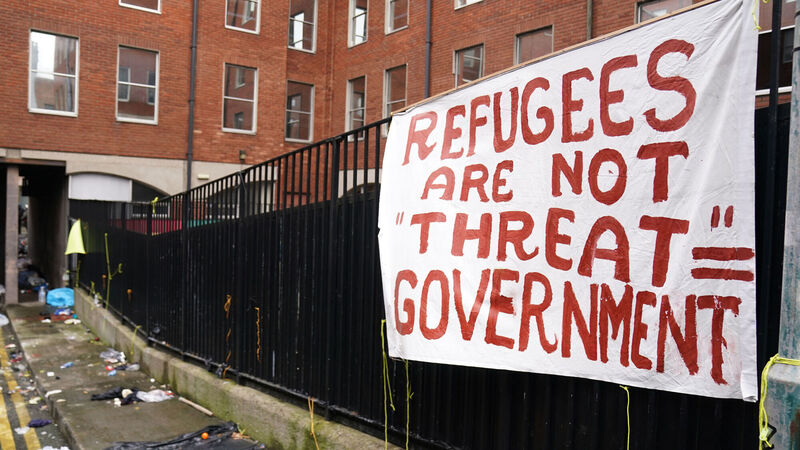After opting in to the EU’s pact, Ireland must increase protections for refugees

Asylum seekers in tents in Dublin city centre recently. New research from ESRI shows that people in Ireland generally have very positive views on immigration, with over 73% of respondents expressing positive sentiments about immigration irrespective of an individual’s region of origin. File picture: Brian Lawless/PA
The Government has decided to opt in to the EU’s Asylum and Migration Pact after Justice Minister Helen McEntee secured Cabinet clearance to seek approval from the Houses of the Oireachtas.
Rather than opting in to creating a sovereign immigration system, the Government has decided to be a part of an immigration overhaul that threatens to place those seeking protection at further risk. As a nation of emigrants, Ireland should be at the forefront of a human-centred approach to migration; leading instead of being led.
Ms McEntee has suggested that Ireland would be “left alone” with the challenge of migration had the country not opted into the pact at the earliest opportunity. Ireland is one of only two countries within the EU that can opt out, the second being Denmark.
The pact contains five core planks — screening regulation; amended asylum procedures regulation; crisis regulation; asylum and migration management regulation; and amended Eurodac regulation. When adopted it will become binding in law.
The minister championed select aspects of the legislation as both sensible and reasonable, namely mandatory processing times, enhanced security, and a strengthened ability to deport those who are unsuccessful in claiming asylum.
However, this legislation could lead to increased border detainment, accelerated processing times that limit the ability of claimants to access legal aid, and therefore access to legal assistance, and increased biometric data collection and surveillance — targeting children as young as six.
Ukrainian refugees will be exempt, which rather suggests that the overhaul of immigration policies is less about enshrining the basic human right to claim asylum, and more about limiting the migration of asylum seekers from the Middle East and Africa.
The legislation was spurred by the 2015 migration crisis when more than a million asylum seekers claimed refuge across Europe from war and persecution in countries such as Syria, Afghanistan, and Iraq. The framing of ‘migration crisis’ indicates a detachment from the plight of asylum seekers, with the people fleeing the focal point, not the cause of their displacement,
The objective of a co-ordinated EU overhaul of immigration policies was to create an equitable system to take the pressure off border member states.
Instead, the EU Migration Pact creates an opt-out system whereby member states can pay fees from the public purse to refuse asylum seekers. This ‘solidarity mechanism’ will not create an equitable system that ensures member states are taking in their fair share of asylum seekers — instead, it will further destabilise migration across Europe and create loopholes into which those most at risk can easily fall.
Amnesty International has stated that the EU Migration Pact will lead to a “surge in suffering on every step of a person’s journey to seek asylum in the EU", adding that the agreement “will set back European asylum law for decades to come".
In Ireland, the topic of immigration has been steadily emerging as a point of discourse, with far-right agitators spreading misinformation to destabilise Irish politics, promoting anti-immigrant racism under the guise of a distorted and manipulated concept of Irish nationalism.
These self-appointed so-called Irish patriots claim to speak for Ireland, but in reality, speak for little more than themselves. This is a vocal minority, influenced and supported by far-right agitators in Britain and the US who do not represent the views and values of the vast majority of the Irish nation.
New research from ESRI shows that people in Ireland generally have very positive views on immigration, with over 73% of respondents expressing positive sentiments about immigration irrespective of an individual’s region of origin. Over three-quarters stated that they believe Ireland should help migrants and asylum seekers, and the overwhelming majority are comfortable with asylum seekers as neighbours.
Why then are our political representatives cowing to far-right demagogues instead of creating a fairer, more equitable immigration system in Ireland? And it isn’t just the coalition parties doing so; Sinn Féin pivoted to oppose the EU Migration Pact at the eleventh hour, stating “Sinn Féin are opposed to open borders” — charged and unnecessary language not dissimilar from common dog whistles parroted by the far right.
Ultimately the EU Migration Pact is about politics; there are more elections this year than any other period in history with billions heading to the polls. With a surge in far-right, anti-migration candidates cropping up at a national level in several countries, many political representatives are shifting to the right in a cynical bid to retain power.
The growth of the far-right is part of a wider decline in democracy and freedoms. This shift to the right cannot be traced back to a single cause.
It is the consequence of a combination of political failures in social, economic, and migration policies compounded by the proliferation of misinformation and disinformation spread at an incomprehensible level across social media platforms and fake news sites.
With the advent of machine learning, the number of websites littered with AI-generated fake news has ballooned with an increase of more than 1,300% since last May, swelling from 49 to 713 sites in less than a year, according to disinformation tracker Newsguard. It is fundamental that concrete steps are taken at a government level to address disinformation and misinformation.
Ireland will have two years from the point the legislation is approved to fully implement the changes. Implementation of the directives and instruments is likely to move at a glacial pace.
It is paramount that each step of this legislation is scrutinised, and efforts be made to increase protections and standards — not decrease them. With European elections on the horizon there is a real risk that this legislation could veer further to the right; Ireland, with its history of displacement, should not be part of an effort to limit and restrict asylum rights.





